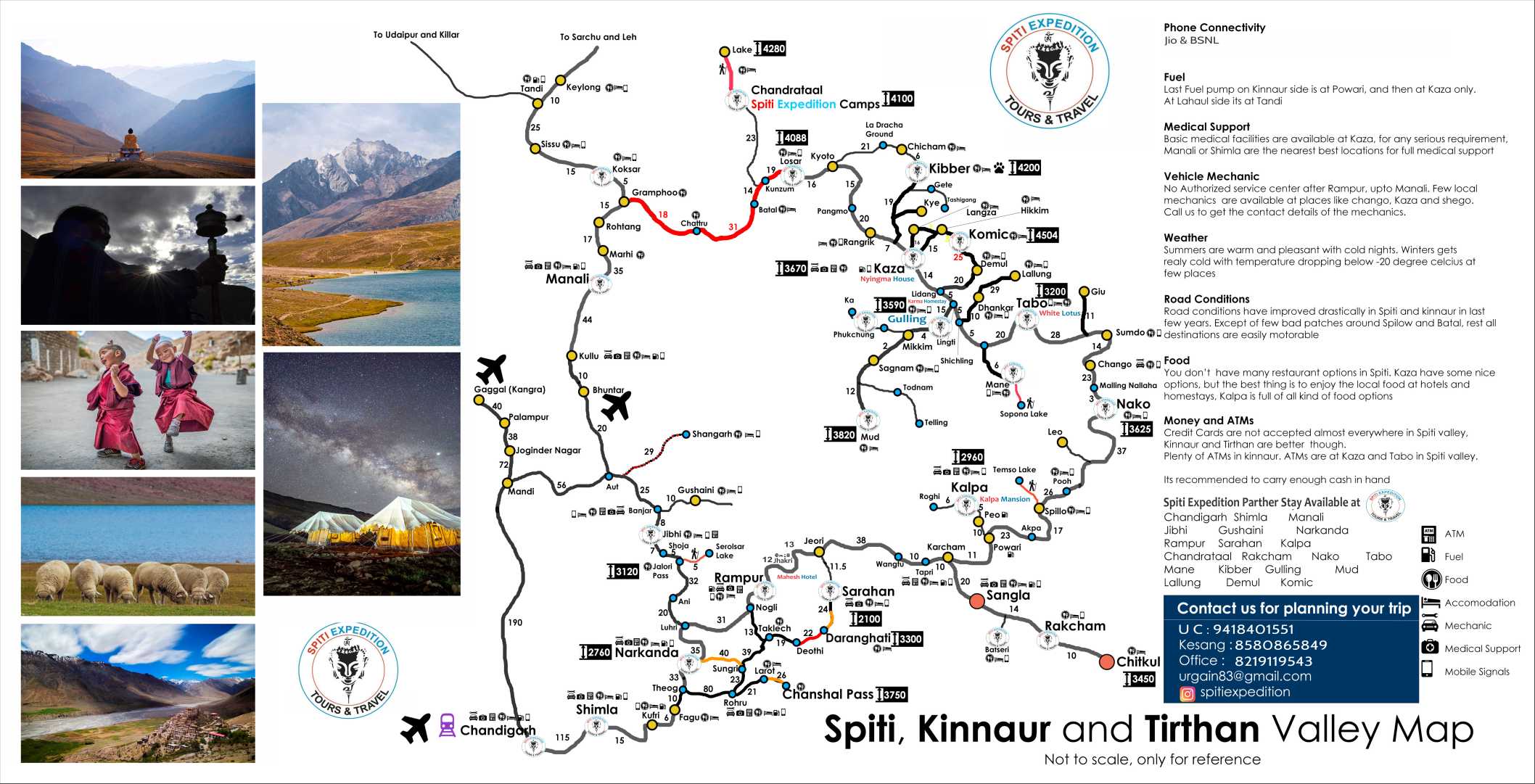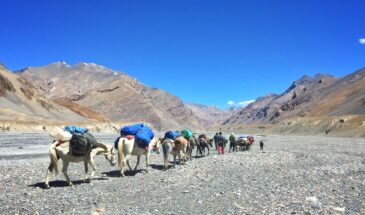- About the Expedition
- Trip Outline
- Trip Includes
- Trip Excludes
- Gallery
Hello Fellow Travelers,
Thank you for choosing Spiti Expedition, at the offset we are extremely excited and totally looking forward to host a memorable trip for you. We love living in outdoors and the adrenaline, we also believe that it is truly the greatest gift of God, the beauty and magic outdoors, hence the need to respect it. We are laying very basic and easy to do guidelines for the same with the motive of leaving minimum footprint, preserving the flora, fauna, biodiversity and ecology of the region along with coming close to local communities and culture of the region. We truly believe that you will help us in initiating this and become an Eco-Traveler, if not already one.
A little on what Ecotourism exactly is-
A dictionary defines it as "tourism directed towards unspoilt natural environments and intended to support conservation efforts". In addition, Eco-Traveler believes in supporting, protection and at the same time experiencing local culture and heritage. Tourism results in social, as well as environmental impacts, and a responsible tourist needs to be aware of this.
Here is how you can help -
Carrying your own water bottle, cups, plates and filling water from natural resource, drinking locally brewed products served in glass or recyclable materials.
Using litter bins to trash items that do not decompose, minimum use of purchases packed in plastic, carry a waste bag for your personal non-biodegradable waste.
Enjoying watching the biodiversity of the geography, not playing loud music or being loud, when we go outdoors, we are borrowing home of animals and birds, it’s our responsibility to ensure they are not disturbed.
Purchasing locally produced items- from handicrafts to breweries to savories
Keeping minimum carbon footprint and nil plastic footprints on the trail through not burning plastic or wood.
Things an Eco-Traveler carries -
Apart from personal clothing and toiletries following items need to be carried in order to make this do it yourself and minimum footprint trek and also for your personal convenience-
Carry your own water bottle, tea up and a tiffin box for packing lunch, instead of using disposable packing material. Water bottle with filters are available, however the natural resources are clean and pristine. It’s good to carry dry fruits and nuts for personal use.
Carry a day bag pack, we will provide potters for those need it, however only essentials can be carried for an overnight trek in a day pack.
A waste bag to collect waste on the way in your day pack.
Travel light and easy to enjoy the true essence of backpacking!
Trip Undertaking
Traveling and Trekking in high altitudes require basic fitness and mental endurance, our team will ensure successful completion and will provide guidance and support, in case of an unforeseen event however, we will handle it to the best of our capacity, and the ultimate responsibility lies with each traveler.
The Parang La trek is an adventurous and challenging trekking route that was a traditional ancient route
followed by traders from Spiti Valley, Ladakh and Tibet. For centuries, traders from Changtang and
Rupshu conquered this unforgiving trail to attend the famous Ladarcha Fair in Spiti Valley. The trekking
starts from Kibber, one of the highest villages in the world, and takes you through the ancient route to
Tibet, over the Parang La at 5600 meters. The trail winds up along the banks of the Tso Moriri Lake,
which is located in the Rupshu area of Ladakh at an altitude of over 4500 meters. The Lake is well known
for Bar-headed geese, black necked crane and Brahminy Ducks. One can also see Marmots and Kiang
(wild ass) along the lake. The Parang La Trek ends at the village of Karzok – situated on the West Bank of
the Tso Moriri Lake at an altitude of over 4500 meters. Karzok is home to a Buddhist Monastery
belonging to the Drukpa lineage and nomads who trade in Pashmina wool and salt.
Route Map
Itineraries
Day 1
Manali
Arrive at Manali in the morning, stay will be arranged in a country side guest house in Old Manali. Spend
the day Relaxing and local sight-seeing in Manali. One can visit Hadimba temple, Vashisht or just take it
easy in café’s in Old Manali.
Day 2
Manali to Kibber via Rohtang Pass and Kunzum Pass
The day will begin early in the morning and will be the longest on road, Manali to Kaza is about a drive of
200kms, with constant change in landscape and altitude. Drinking a lot of water is the key to remain
healthy. We will cross Chhatru, Batal and Losar villages in Spiti. We will also be crossing two high altitude
passes on the way. Rohtang pass (13500 ft) is the gateway to Lahaul Spiti district of Himachal leading to
Leh and Kunzum Pass (15100ft) the highest pass in Spiti. We will reach Kaza by evening, have dinner and rest. Stay will be arranged in a homestay.
Day 3
Acclimatization at Kibber
Day 4
Trek from Kibber to Thaltak Meadow – 4875M (18 kms / 4 hours)
The first day of your Parang La trek is all about getting the body and the mind ready for the challenges of
the beautiful Himalayan wilderness that lies ahead. The trek from Kibber to Dumla is an easy walk, but
take your time, as these Spitian gorges are renowned for being hard-going. You first descend the gorge
bed and ascend towards the Thaltak Meadow from Dumla. Alive with wild sceneries, with deep gorges of
Spiti River, Thaltak makes for a thrilling place to camp for the night in. Even at this height, the
temperatures could get high, thanks to the reflection of the sun, so put on those sun glasses because you
might very well need them.
Day 5
Trek from Thaltak to Jagtha to Bonrojen – 5180M (14kms / 7 hours)
On the third day of your Parang La trek, keep those almonds in handy, because this is a long and
strenuous day walking 8 km to Jagtha (15,700 ft.) and then 6 km to Bongrojen (17,000ft). That’s almost
half of Mount Everest!
Day 7
Trek from Bongrojen to Parang La to Dak Karzong – 4940M (10 kms / 5 hours)
On the fourth day of your Parang La trek, it is D-Day. Drink some chai, have freshly cooked continental
breakfast, breathe in the early morning air and head out. You’re looking to reach your day’s destination
in five hours. The final 4 km trek is a steep 2-hour climb to Parang La (18,300 ft). The pass lies on the
traditional trade route between Ladkah and the Spiti Valley. Bask in the view of the postcard-perfect Spiti and Changthang valleys from above. You’ll also be able to catch glimpses of your final destination,
Ladakh, as you can see Parilungi, the first Ladakh peak from here.
After spending sometime here, we descend to Pare Chu river. Breathe a sigh of relief as you’re done with
steep gorges for now. Coming up are acres and acres of broad plains, until you reach Dak Karzong, where
you’re going to halt for the night.
Day 8
Trek from Dak Karzong to Datang Yongma – 4725M (12 kms / 5 hours)
On the fifth day of your Parang La trek, it’s going to be a musical day. Remember all those songs that are
fun to sing in groups? Well, now is the time to sing your heart out as you trudge along in an open valley
with a well-marked trail. You’re going to walk along the left bank of the River Pare Chu, until you camp
overnight at Datang Yongma.
Day 9
Trek from Datang Yongma to Chumik Shilde (16 kms / 5-6 hours)
On the sixth day of your Parang La trek, more beautiful Himalayan wilderness awaits. A lot of people
think that trekking is just the process of getting to an end point, where celebration lies. But little do they
know that the process itself is celebratory! Today, we follow the trail to Racholemo (14000 ft.) then
Norbu Sumdo (14400 ft.) and across to Chumik Shilde, all of which make you want to celebrate nature
like never before. Start early, as the winds can be strong in the afternoons.
Day 10
Chhumik Shirde – Kyangdom(4350m) Duration: 5 hours
The trek continues on the flat ground of the Changthang plateau with some spectacular views along the way.
Day 11
Kyangdom – Tso Moriri (4450m) Duration: 5 hours
Walking through the Para Chu valley, the valley suddenly opens up and the landscape turns greener
as you approach the lake. The valley is famous for the wild life mainly comprising of Kyang (wild ass). Camp midway on the lake’s banks on the way to Karzok.
Day 12
Tso Moriri – Karzok (4267m) Duration: 8 hours
Walk along the lake right up to the Karzok village. The day might seem never-ending, because
though Karzok looks near enough, it takes 8 hours to finally reach the campsite. But the walk is worth it with all the flora and fauna that one gets to see.
- All camp meals
- All accommodation during the trek
- 1 night stay in Manali 2 nights stay in Kibber premium homestay with meals on MAP
- Guide and porter for the trek and all expenses pertaining to them
- All Camping gear (tents and sleeping bag)
- Travel insurance
- Personal Equipment’s and rescue operation in case of emergency
- Any expenses which arise due to a change of the itinerary, because of landslides, political trouble, and strikes etc.
- Laundry, phone calls, internet, heater charge and Wi-Fi services.
- Porter charges for carrying extra luggage.
- Transportation from Manali to Kibber/ Tso moriri to Leh
- Area Permit & TIMS Cards.



